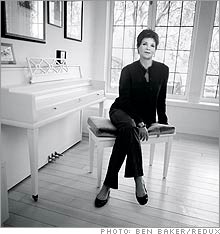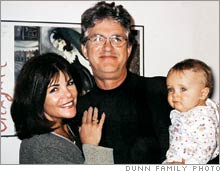The survival of Pattie DunnAfter beating criminal charges in Hewlett-Packard's pretexting scandal and waging her fourth battle with cancer, the former HP chairman talks to Fortune's Pattie Sellers.(Fortune Magazine) -- She was diagnosed with breast cancer in 2001, melanoma in 2002, ovarian cancer in 2004, and a recurrence, in the liver, in 2006. Yet for all her health travails, something else turned out to be Pattie Dunn's most shocking nightmare this past year: her role in the Hewlett-Packard spying case. The scandal exploded last summer when venture capitalist Tom Perkins quit the HP board over the outing of a fellow director as a source for news stories about the board's conversations. Perkins went to federal agents and identified Dunn as the leader of a board probe gone awry. (The Securities and Exchange Commission reached a judgment in May that HP (Charts, Fortune 500) broke the law in failing to disclose why he quit.)
Dunn had had, until then, a pristine reputation, having risen from a secretary's job at Wells Fargo to CEO of Barclays Global Investors and No. 11 on Fortune's list of the Most Powerful Women in Business. As an HP director, she played a central role in ousting CEO Carly Fiorina and recruiting Mark Hurd as Fiorina's successor. Dunn does everything with vigor, a quality that has kept her, at 54, alive and fighting. But in seeking the source of HP's boardroom leaks - an assignment she accepted in 2005 with her new title of non-executive chairman - her zeal got the best of her. The probers used aggressive tactics like falsifying their identities to obtain personal phone records of directors and journalists, a ploy that introduced a new word into the business lexicon: pretexting. Though the legality of pretexting was murky (it's now clearly illegal), the controversy got hot enough for the HP board to remove Dunn last September. The following month California's attorney general indicted her on four felony counts. While the state dropped all charges in March, the saga isn't over. Dunn is named, with other directors, in civil suits by shareholders, and she is still fighting for her reputation. (Meanwhile, the U.S. Attorney in Northern California is investigating HP's use of pretexting.) In her first interview since charges were dropped, Dunn met with Fortune editor at large Pattie Sellers at her home in the hills 20 miles east of San Francisco, with her husband, Bill Jahnke, a retired banker, by her side. She was the picture of health. Dunn was candid about her mistakes, blunt about her battle with Perkins, and pragmatic about her multiple ordeals. Excerpts: Why have you agreed to talk? At one level I don't care what people who don't know me think about me. But I also have to think about my legacy. The idea that my grandchildren can Google me ten years from now and see horrible information that goes to the heart of my character distresses me. I need to do what I can to change that. What was the most difficult part of the past year? The worst was the period from August, when I had surgery for cancer recurrence, through early October, when charges were filed against me - and then I started chemotherapy two days later. I was pretty much grounded that whole time, except for going to Washington to testify before Congress. I was recovering from surgery and also being hounded by the media. We were living in San Francisco at the time, and at one stage I didn't go out of my apartment for 2 1/2 weeks. Given that privacy was the core issue in the HP case, that was pretty ironic. How did you keep your head together? I have an incredibly wonderful family. I'm also quite good at compartmentalizing. I was able to draw a circle around the problems. It was distressing, but it was also fascinating. I'd turn on the TV and see 15-year-old video of myself walking down the hall at Barclays Global Investors. It was an out-of-body experience. Did you imagine yourself in prison? I once asked my lawyer, "Do innocent people go to jail?" He said, "Yes. That's why you have to commit yourself to work hard on this case." I probably spent 100 hours in his conference room. We were ready to go to trial. Why, in your mind, are you not culpable for the spying scandal? I didn't run the investigation. As non-executive chairman I had no executive authority. I tried to get the company to hire [intelligence firm] Kroll to run the investigations. [HP opted to run the probe internally.] Did Mark Hurd hang you out to dry? Mark was under the same pressure I was. He's been very successful as HP's CEO, and I'm sure shareholders are very relieved that he's overcome this huge distraction. What's your view of the non-executive chairman position in general? About 9% of U.S. companies have non-executive chairmen, and there's little understanding of the role. In my case the media seemed to have an almost willfully ignorant belief that I was the boss, that I had my hands on the levers of the company. In fact, no one at HP reported to me. I had no staff, no budget, no signing authority, and no office at the company. Is the non-executive chairman role inherently problematic? The best governance model calls for an independent chairman. But would I recommend that anyone accept the job? No. In the event anything goes wrong, you're perceived to have responsibility, but you don't have authority. If you take the role, you'd better have an iron stomach, a lawyer lined up, and your PR expert on call. Let's say a friend calls you and says, "I'm on the board of X Corp. and we have a leaker on our board. Give me some advice." Don't ignore the problem because of what happened at HP. Everyone who has sat on a board understands how leaking destroys trust between the board and management. Securities laws are at stake as well. The board has to respond. I don't take the view that it's an affront for a director to be the subject of an investigation. Public company directors expect to give up some privacy. Some people say that the HP investigation was a veiled attempt to get certain people, like Perkins, off the HP board. That's nonsense and doesn't fit the facts. I asked Tom to be chairman of the nominating and governance committee in 2005. I had an idealistic view, in retrospect, that Tom and I, coming from different perspectives, could model for the board how people coming from different places can work together for the good of the company. Do you think gender - your being a woman - played a role in the blowup? I believe it did. The facts of the situation are pretty straightforward. When Tom's friend on the board [George "Jay" Keyworth] was identified as a - if not the - leaker, Tom wanted his name kept from the board. The CEO, outside counsel, general counsel, and audit committee chairman all advised me that this was improper. As it happened, I wasn't the director who disclosed the leaker's identity to the board. But Tom went ballistic and claimed I was breaking a deal with him to keep the leaker's name quiet. I had never made that deal with him. But the disclosure made him extra-special, over-the-top angry. So what makes you think it was a gender-based battle? I've worked for and with men successfully all during my career. But during this ordeal I heard from hundreds of women of all ages and backgrounds who were convinced that Tom would not have sought to publicly humiliate me if I were a man. Do you feel defamed? There's no doubt in my mind I've been defamed. Until this happened to me, I assumed that when a corporate executive was charged with a crime, they were guilty. So I assumed that everyone would think I was guilty. Since the charges against you were dropped, do you feel exonerated? I knew I was innocent, and I do feel exonerated. I was sorry that some of the media coverage didn't reflect the transcript of the judge's reasons for dropping the charges against me. The primary reason was "in the interest of justice." Health considerations were well down the list. And I've gotten about 1,000 supportive letters and e-mails. I get the sense that not everyone thought I was "colossally stupid" - in the words of the former California attorney general - or a criminal who ordered spying on people's private lives. Have you talked to Carly Fiorina? Not since she left HP. But about two months ago I ran into Carly in the security line at the Kona airport [near Dunn's Hawaii vacation home]. She was cordial. She asked me about my health. I got the sense that she was sorry about what had happened at HP. Regarding your cancer, what's your prognosis? I ended five months of chemotherapy in February. I feel really good. I'm hoping to remain in remission for a good long while. But you've had cancer four times. Ovarian cancer recurs. The name of the game is to turn it into a chronic disease. I'm dealing with my remission aggressively. And I get something I couldn't when I was an executive: eight hours of sleep most nights. Basically I'm a very healthy person. There's a gene that links breast cancer with ovarian cancer, have you had genetic testing to determine whether you have it? Yes, I've been tested. In my case the results were misleading, so they weren't helpful in choosing the right treatment options. But I support genetic testing for cancer, because in the vast majority of cases the results provide useful knowledge. Knowledge is power. What's your best advice to people dealing with cancer? It starts with the support system. I have the most incredible support system: my husband, four children, and four grandchildren who are nearby, and the best sister in the world. She runs a website, pattiedunn.com. I also have a great doctor, Bethan Powell, who told me on the day I was asked to leave the HP board, "I just want you to know, it doesn't matter if they don't want you at HP, because there will always be a place for you here at the cancer center." [She laughs.] Have you thought that the stress of the HP scandal might have weakened your immune system and your fight against cancer? I know there's a link between stress and ovarian cancer in particular. But I choose not to dwell on that. Have you cried through your ordeals? I cried once when I was first diagnosed with breast cancer in 2001. That was in the "Why me?" phase. I got past that quickly. See what Pattie Sellers has to say about "The Power of Women" in The Huffington Post. From the June 11, 2007 issue
|
Sponsors
|


